YEMEN,
INDISCRIMINATE WARFARE
A full-scale humanitarian crisis












How the widespread use of explosive weapons laid waste to Yemen
250,000 people have died during Yemen’s six-year war, including more than 131,000 people from the indirect consequences of conflict, such as lack of food, health services and infrastructure. More than 7,000 civilians were victims of airstrikes and shelling between 2018 and 2020. In 2020 only, at least 1,300 civilians were affected in landmine or explosive remnants. These incidents remain largely under-reported.
• Since the beginning of the conflict in 2015, a total of 20,000 civilian casualties (UN Figures)
• At least 23 000 airstrikes since March 2015
• Around 70% of the casualties of explosive violence are civilians (AOAV)
• Airstrikes cause the most harm, with more than 2 third of civilian deaths and injuries caused by attacks
Baptiste Chapuis
HI’s former Head of Mission in Yemen
Baptiste Chapuis is the Advocacy Manager on Yemen. HI works in 9 health facilities in Sanaa, in the North of the country, and in one hospital in Aden, in the South. Baptiste describes a catastrophic situation with overwhelmed medical teams and patients shocked.
Mines and bombing - shameful civilian toll
Unacceptably large numbers of mine and bombing casualties continue to arrive in the 9 health centres mainly in Sanaa and Aden where HI works. HI has treated some 870 casualties of mines*, improvised explosive devices and explosive remnants of war including cluster munition remnants* between 2015 and 2019. Until December 2019, HI has treated more than 3 000 victims of all kinds of explosive weapons.
* The use of anti-personnel mines and cluster munitions is banned under international law.
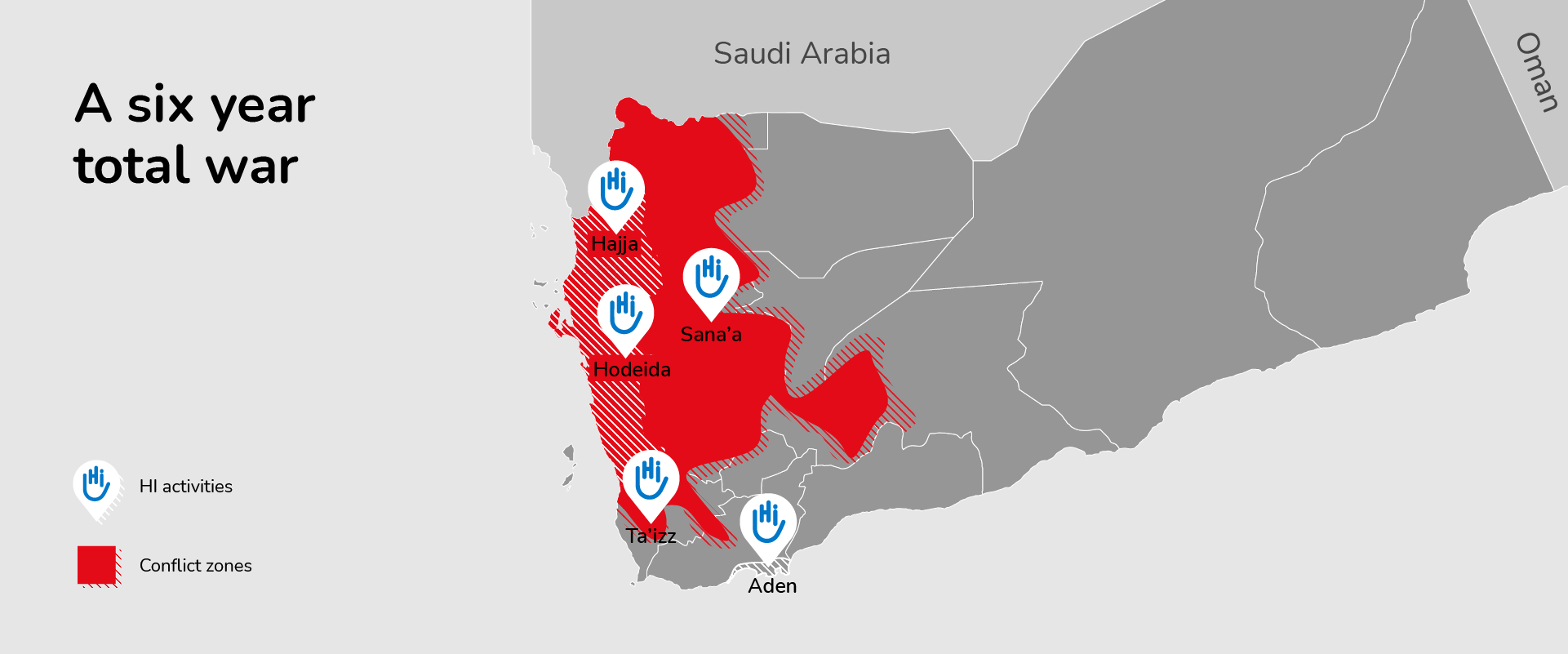
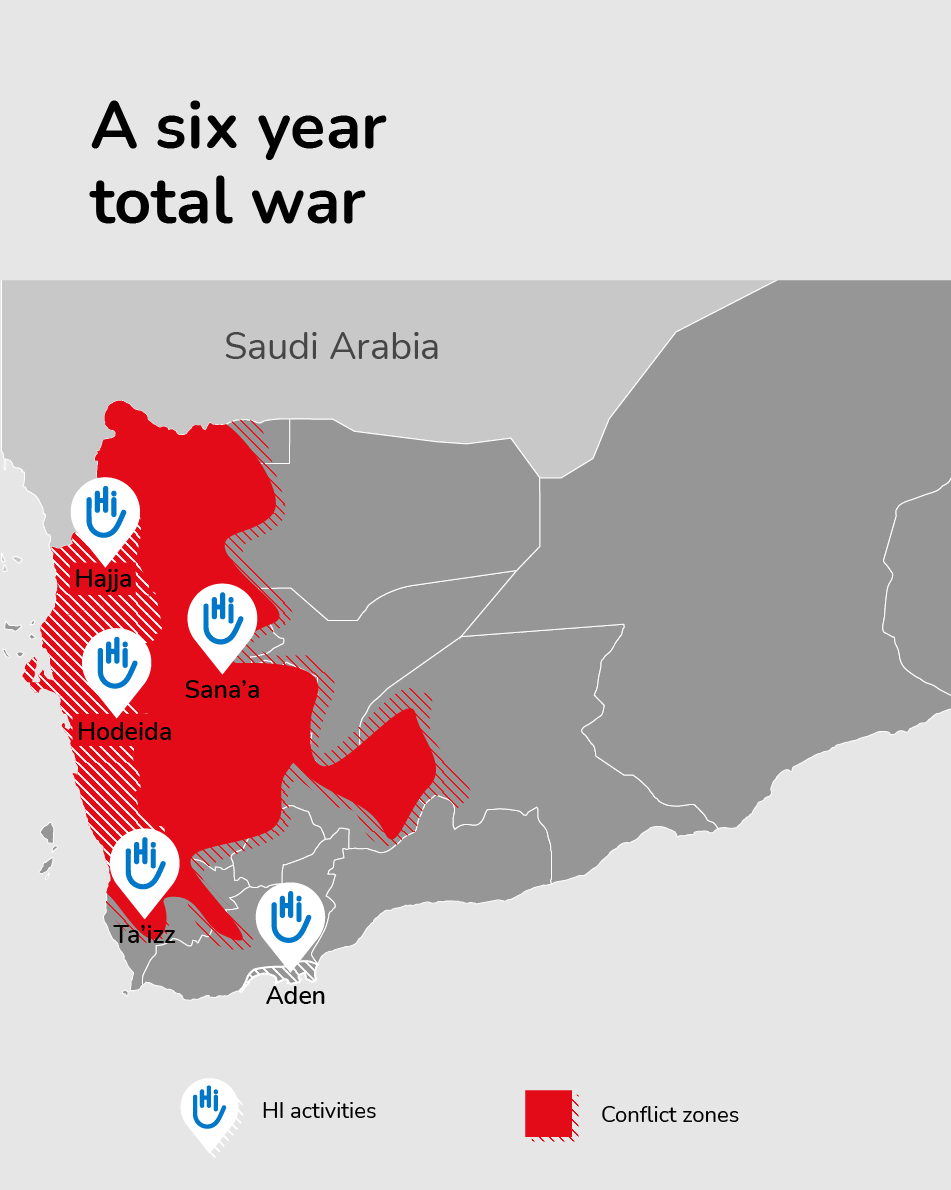

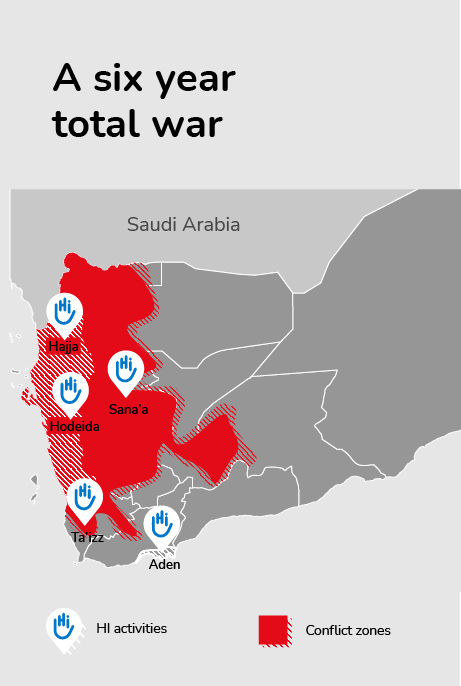
HI in Sana'a & Aden
Eighty HI staff members have been working in 9 health structures since 2015.
1. Rehabilitation sessions and advice: 30,633 people
2. Psychosocial support and counselling sessions: 22,999 people
3. Crutches, wheelchairs, etc. provided: 35,371 (Mobility Aids, specific items and splints)
4. 522 people fitted with prostheses and orthoses
5. 2,250 hygiene kits distributed
6. 807 medical staff trained in rehabilitation
7. Soutien financier à près de 700 ménages
Launch of HI’s programmes in Aden, Hodeidah and Hajjah
HI is preparing to lead rehabilitation and psychological support activities in the governorates of Aden, Hodeidah and Hajjah.
Its teams will work closely as possible with the communities. HI will cover the cost of transportation to the hospital.
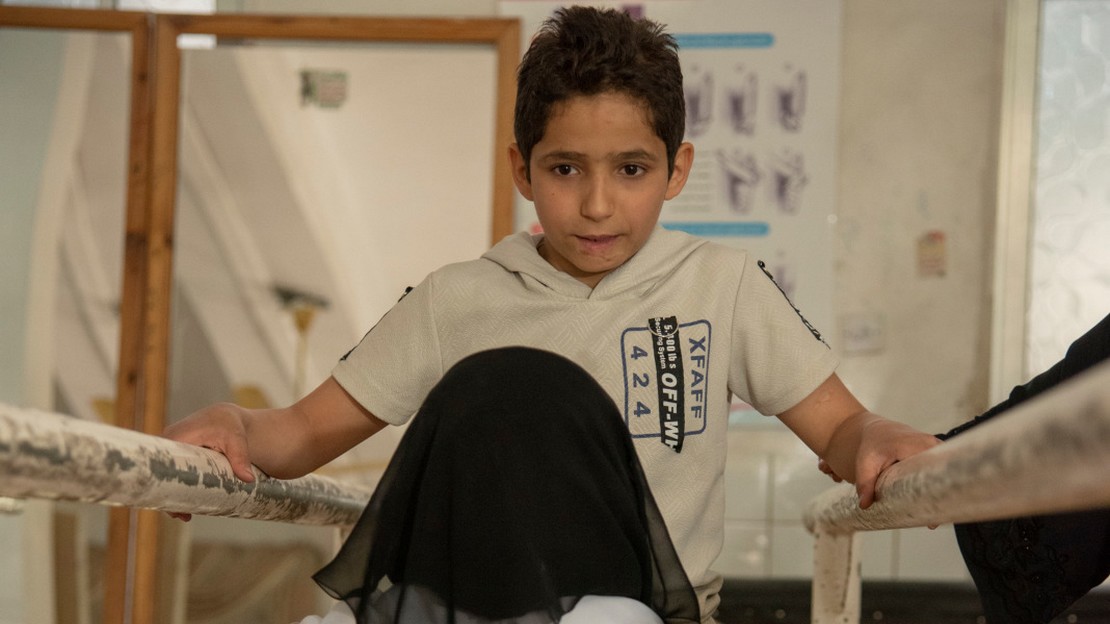
Yasser - The 12-year-old who lost everything
Yasser was doing his homework with his father on the flat roof of their home in Taiz when a missile exploded nearby. When the 12-year-old woke from a coma in hospital the next day, he discovered that his father had been killed, his home flattened, and his right leg amputated.
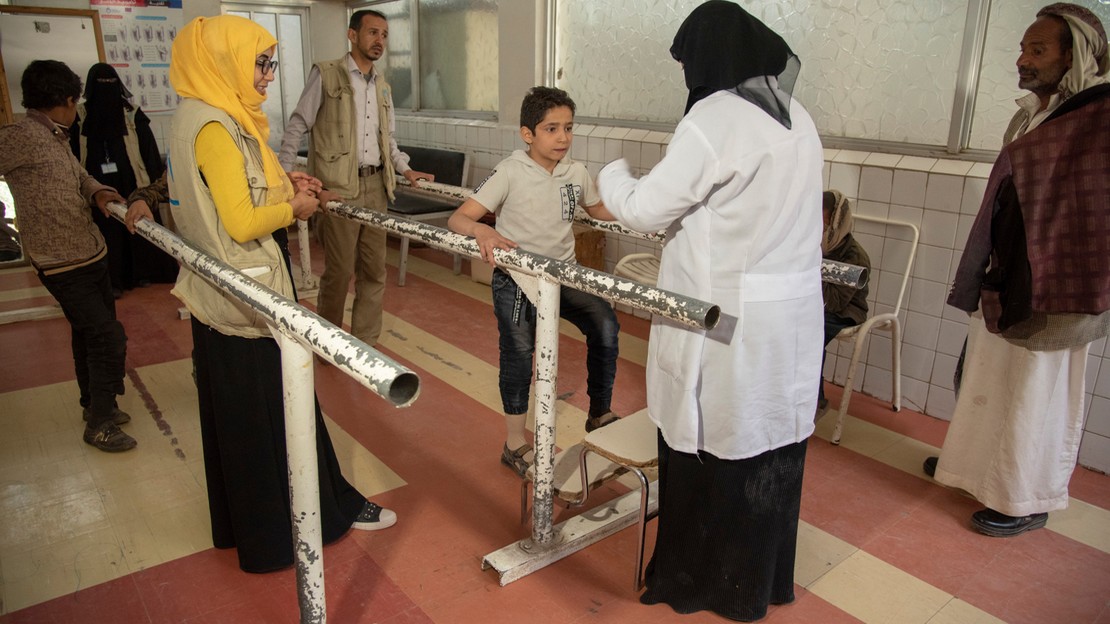
Yasser - The 12-year-old who lost everything
After a month of convalescence, his mother travelled with him to Sana’a, where HI gave him rehabilitation care.
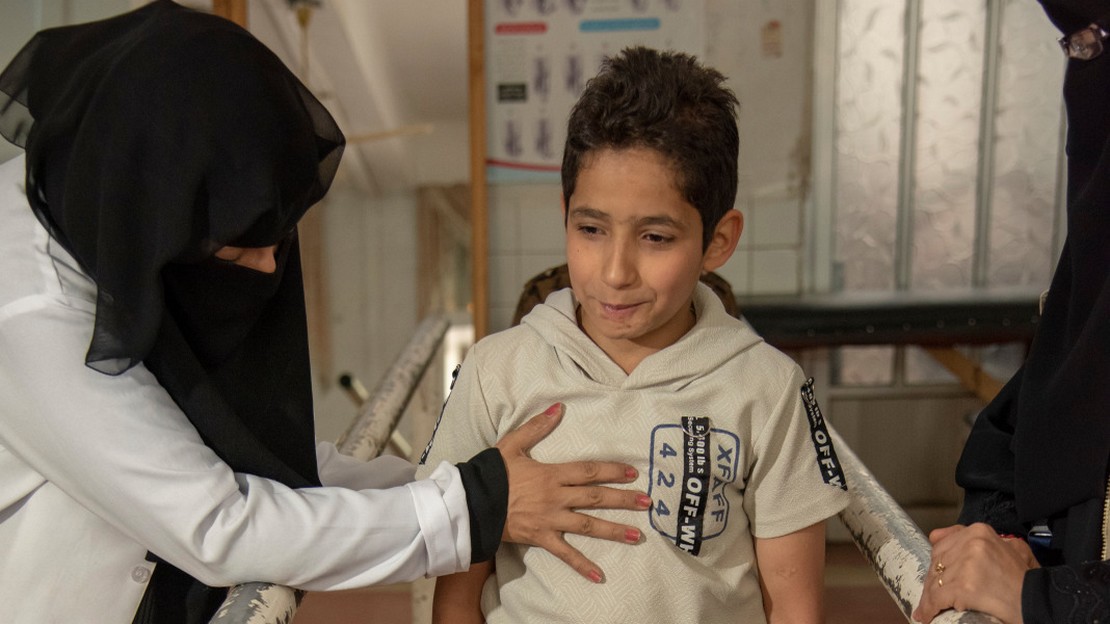
Yasser - The 12-year-old who lost everything
HI's psychologist, Sana, recalls the first time she met Yasser: "Yasser had lost his interest in life. He didn’t want to talk or see anyone. We had to restore his confidence and his will to live."
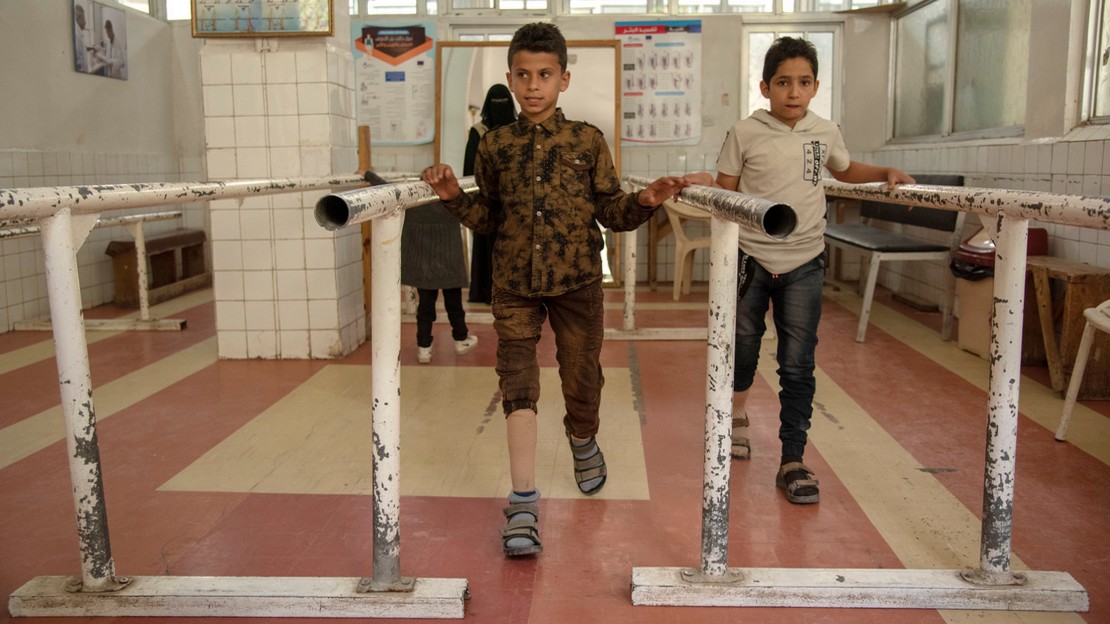
Yasser - The 12-year-old who lost everything
"We helped him feel less isolated. We gave him elbow crutches – which made it easier to walk than his original auxiliary crutches - and put him in a group with children his own age, who were in the same situation and learning to walk again. The prospect of being fitted with a prosthesis restored his hope of being a child like any other."
This is Yemen today
A forgotten crisis
The United Nations has appealed for $3.85 billion to meet humanitarian needs in Yemen... But humanitarian aid in Yemen remains largely underfunded. Early March 2021, the donor conference in Geneva raised only $1.7 billion, which is largely insufficient.
The social and economic collapse of Yemen
<p><img alt="Pénurie" src="/sn_uploads/ca/Penurie-placeholder.JPG" style="margin: 5px; float: left; width: 120px; height: 102px;" />Le Yémen est dépendant des importations. Celles-ci sont gravement perturbées par les combats et le blocus imposé en 2017 par la coalition internationale menée par l’Arabie saoudite : avant le conflit, le pays importait 90 % des produits alimentaires de base ; ils ne sont aujourd’hui plus disponibles.</p>
Quand ils sont sur le marché, ces biens sont inabordables à cause de l’inflation vertigineuse de ces derniers mois. Le prix de l’essence a, par exemple, triplé en trois ans. Selon l’ONG Care, au 31 octobre le prix d’un kilo de riz représente 65 % du revenu quotidien d’une personne. L'accès aux services, en particulier pour les personnes venant de régions éloignées, est devenu impossible en raison de leur coût et de celui du transport.
La plupart des salaires ne sont plus payés. Les enseignants, le personnel médical, le personnel administratif n'ont plus les moyens de subvenir à leurs besoins ; la plupart d'entre eux refusent de travailler volontairement de sorte que les services s'écroulent. Les services souffrent également des combats et de la destruction des infrastructures publiques : 50 % des établissements de santé ne peuvent plus fonctionner.




SHORTAGES
Yemen depends on imports. Fighting and the blockade imposed in 2017 by the international coalition led by Saudi Arabia have severely disrupted these supplies. Before the conflict, the country imported 90% of its basic foodstuffs. Today, almost nothing gets through.




INFLATION
When supplies do reach the market, months of rocketing inflation means they are impossible to afford. According to the United Nations, the price of food doubled between 2015 and 2019 and prices continued to rise throughout 2020. The situation is exacerbated by the COVID-19 pandemic which led to a sharp drop in remittances – a lifeline for many families where 80 per cent of people live below the poverty line.




COLLAPSE OF SERVICES
Most wages are no longer paid. Teachers, medical staff and administrative personnel no longer have the means to support themselves. Since most refuse to work without pay, services collapse.Services have also been affected by fighting and the destruction of public infrastructure: 50% of health facilities are no longer in operation.
HI has set up an emergency rehabilitation service
In response to the Yemen conflict, HI has set up an emergency rehabilitation service in Sana'a. This is what makes rehabilitation in conflict situations unique.
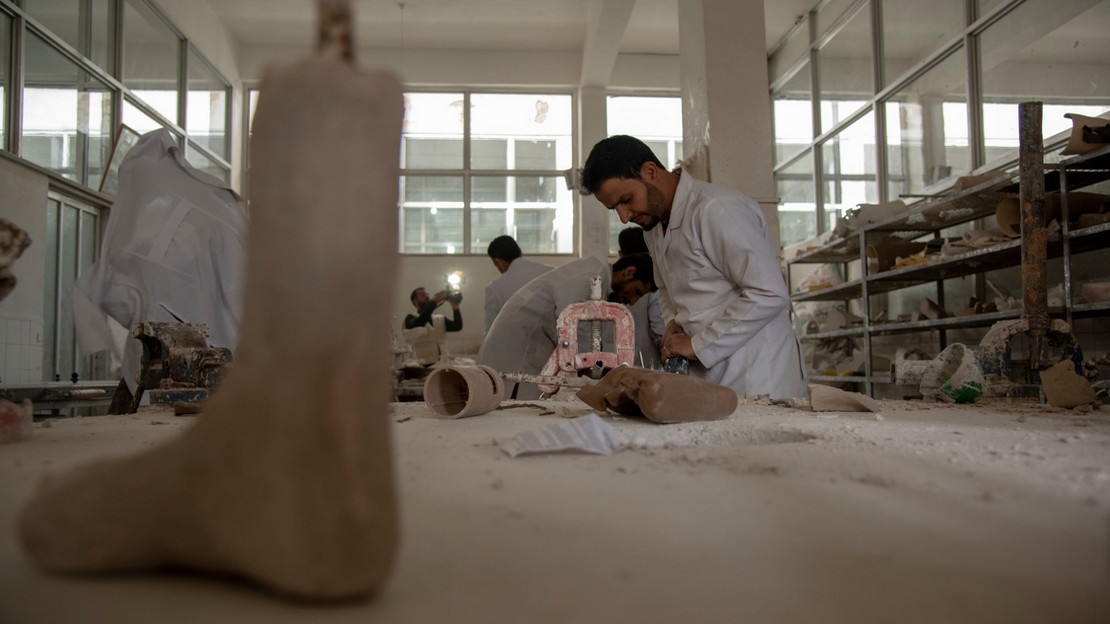



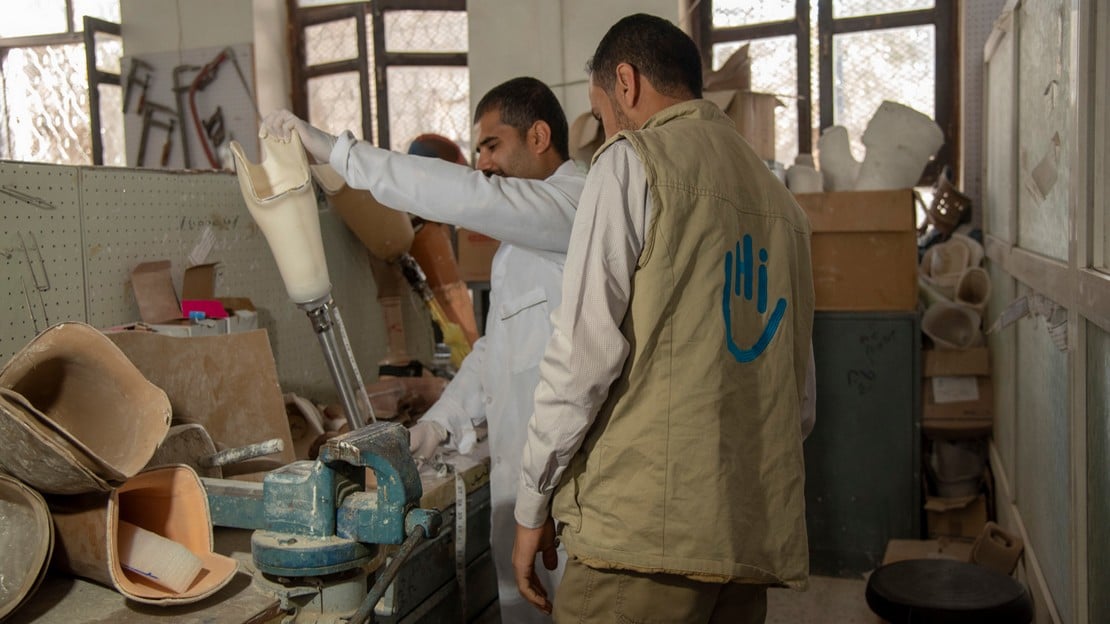



MOBILITY
HI begins the patient’s rehabilitation care the day after their operation. We supply them with technical aids, such as crutches, so they can walk without help. This restores some of their mobility and dignity. They can go to the bathroom alone, without needing someone to take them. Psychologically, it makes a big difference.
EXERCISES
Physiotherapists start with basic hands-on treatment. They perform gentle exercises, massage the scar to prevent stiffness and provide practical advice to patients and their families on how to clean the stump and move without pain, which exercises to do in order to restore their mobility, how to prepare the stump for a prosthesis, etc. Caregivers play a decisive role.
EMERGENCY
Post-operative care almost did not exist in Sana'a. We set up an emergency rehabilitation service and trained more than 500 medical staff. Patients would lie in hospital without moving, in the same position, for days or weeks and then return home. They risked muscular contraction, which can cause problems bending an affected leg - and therefore walking again - or using an arm to drink, eat or do other routine tasks.
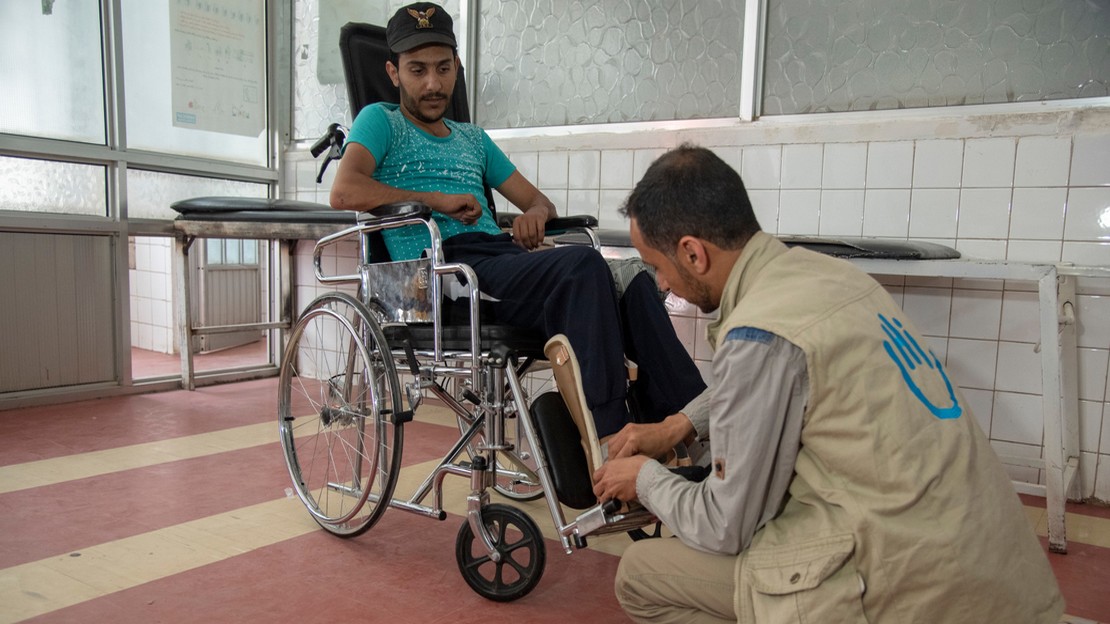



EDUCATION
Our physiotherapists tell the patient why they need to do their rehabilitation exercises, such as bending their leg to climb stairs, or doing routine tasks with their arm such as washing, drinking and dressing. Patients need to understand the risk of disability if rehabilitation exercises are not done properly..
EVERYDAY ACTIONS
Rehabilitation exercises are always associated with everyday tasks to make sure patients do them at home. They are discharged rapidly from crowded hospitals where new patients arrive daily. We give them as much information as possible in a short space of time to make it more likely they do the exercises at home.
#StopBombingCivilians
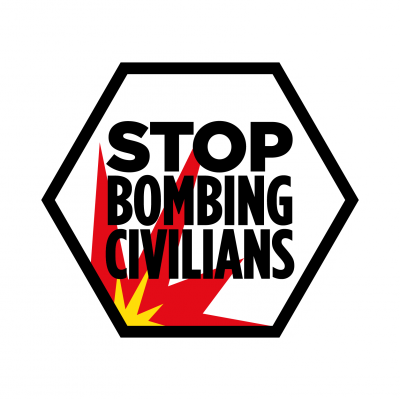



HI is leading an international campaign against the bombing of civilians. Sign our petition and force governments to end the use of explosive weapons in populated areas.
The international community must save Yemen
March 2017 : Press conference in Paris with several NGOs to alert the media to the crisis in Yemen.
April 2017 : International Donors Conference; publication of a joint appeal.
November 2017 : Joint declaration of NGOs against the blockade imposed by the international coalition.
January 2018 : HI calls for the port of Al-Hudaydah to be reopened.
3 April 2018: International Donors Conference .
May 2018 : Joint statement against the sale of arms to Yemen
Juin 2018: Inter-NGO press conference on the humanitarian crisis and the protection of civilians in Yemen
October 2019: A diplomatic process is launched in order to draft international agreement against explosive weapons in populated areas. This agreement will be proposed for adoption by States at the Dublin conference in 2021.
As a member of several NGO coalitions working in Yemen or involved in humanitarian action on this crisis, HI regularly draws the attention of policymakers to the humanitarian disaster in the country.
HI calls on governments and the international community to put pressure on belligerent parties to:
End the use of explosive weapons in populated areas and comply with international humanitarian law.
Financially support humanitarian aid in Yemen which remains largely underfunded
Bring an end to illegal attacks on civilians in Yemen.
Raise the de facto blockade that hampers the delivery of humanitarian aid and commercial goods, and worsens the humanitarian crisis in the country.
Lift unconditionally and permanently all obstacles to the delivery of humanitarian aid and commercial goods in Yemen.
Ensure access to humanitarian services for all affected populations.
HI is also leading an international campaign against the bombing of populated areas and calls on governments to end this practice, of which 92% of casualties are civilians.








Credit: ISNA agency / HI











